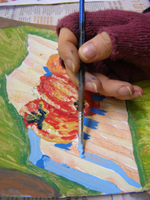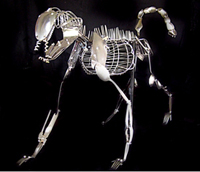Art therapy for mental health recovery
What is art therapy?
 Art therapy usually focuses on the art process rather than the final form. How you feel while making your art and what you learn about yourself is the most important thing.
Art therapy usually focuses on the art process rather than the final form. How you feel while making your art and what you learn about yourself is the most important thing.
Art therapy can help you cope with difficulties and stress, and speed up the recovery process.
Art therapists work with people of all ages and backgrounds – you don’t have to be an artist to benefit.
We provide a safe, supported environment to help you:
- give voice to experiences and feelings not easily expressed in words
- relax and de-stress
- develop self-awareness and self-esteem
- work on social skills
- manage behaviours and/or symptoms
- solve problems by looking with a different perspective.
There are several different forms of art therapy available, depending on your needs.
Art therapy provides a safe space to explore "art for arts sake" in your own way. This can happen in an open studio setting with a little guidance or in a supported, structured class where you can learn different art skills. Engaging in creativity in this way can aid recovery as it helps you to focus, relax and express yourself.
Art therapy uses the creative process of making art as a safe way to represent your inner experiences, develop awareness and support personal change. Along with creating art, the art therapist may use relaxation and visualisation techniques and guided imagery, in the therapy session. This can help you cope with difficulties and stress, and speed up your recovery process. The art therapist offers a safe, supported holding space to allow a person to process difficult emotional issues.
All types of visual art forms may be used, such as painting, drawing and clay work.
What participants say about attending art therapy
"It's a good place to express yourself creatively... I like the atmosphere – it's good to relax. You don't have to try too hard to create something. You can experiment."
 "It's a non threatening environment. I've got the freedom to do what I want. It's a non-competitive atmosphere and you get support. I suppose it's the common ground that everyone else has a mental illness and there's no judgement."
"It's a non threatening environment. I've got the freedom to do what I want. It's a non-competitive atmosphere and you get support. I suppose it's the common ground that everyone else has a mental illness and there's no judgement."
"I have a strong motivation to use this as a component in restructuring my life. The artistic and creative aspects are crucial."
"It's helpful for me to get out and be creative and to have social interaction. It's as the name suggests – a place to be expressive and creative."
"The art therapy and creativity has really helped me grow and learn new things about myself... it has helped me make the changes I need to get better."
Acknowledgements
Creative Expression Centre for Arts Therapy (CECAT) | Reflections Art Studio
This publication is provided for education and information purposes only. It is not a substitute for professional medical care. Information about a therapy, service, product or treatment does not imply endorsement and is not intended to replace advice from your healthcare professional. Readers should note that over time currency and completeness of the information may change. All users should seek advice from a qualified healthcare professional for a diagnosis and answers to their medical questions.